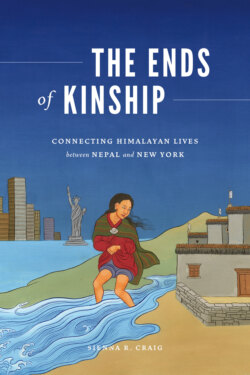Читать книгу The Ends of Kinship - Sienna R. Craig - Страница 22
На сайте Литреса книга снята с продажи.
PART II PARENTS AND CHILDREN
ОглавлениеEducation is a social process; education is growth; education is not preparation for life but is life itself.
—JOHN DEWEY, EXPERIENCE AND EDUCATION
Education-driven out-migration from Nepal’s high mountains to boarding schools and monastic institutions in urban Nepal or India is not unique to Mustang. It is a cycling out the mountains but not necessarily a cycling back. These patterns are bound up in money, obligation, and love—with parents and sponsors, both foreign and domestic. Likewise, the khora of migration exists through seasonal movement between summer schools in Mustang and winter schools in Pokhara or Kathmandu and through the slower turning of the wheel of time as children are sent away, only to return once a year, or less, to their village roots.
The relationship between parents and children is a form of khora: a circling of support and obligation, expectation, surprise, and care. But education portends broader social change. It demands answers to new questions: What does one need to know? What does one want to know? What counts as knowledge? Is education necessarily a pathway to socioeconomic advancement?
Education opens up new possibilities even as it changes the world, by changing ways of knowing the world. Sometimes children born in New York spend their early childhood with grandparents in Nepal, returning to New York when they are school-aged. Meanwhile, their mothers may be caring for American children as an economic strategy. Here, the ends of kinship include the fraying of connections between parents and children, people and place. But these ends can also be refashioned: through school “families” as well as within extended families across time and space, through the dance of language.
In the short story, “Letters for Mother,” Wangmo is born into a position of low social status in Monthang. Her life is changed when a Swiss man decides to support her education in Kathmandu. What does this opportunity come to mean? How does it shape her sense of self and her place within the wider Mustang community? Where does it lead? How different is Wangmo’s experience from that of her daughter who is growing up in Queens?
The ethnographic chapter, “Going for Education,” begins by describing the ways in which outsiders—individuals and institutions—are implicated in education-driven out-migration. It explores the logics by which parents have made decisions about their children’s futures. This includes considerations about the shortcomings of the Nepali national education system and the role of private as well as faith-based institutions in educating Mustang youth. Mustang’s cultural connection to Tibet shapes educational futures as well as senses of identity. Even so, American educational ideals become assimilated into Mustang-based institutions, and efforts to retain linguistic and cultural knowledge from Nepal are being carried out in New York. Still, education, even in its most advanced forms, does and does not transform social values: the ways we see ourselves and the ways we treat one another.
